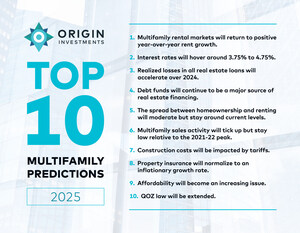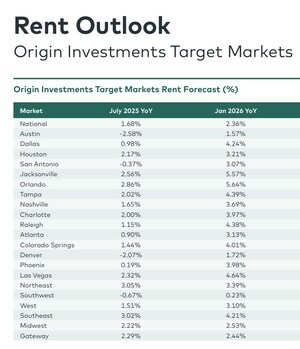An analysis by leading manager Origin Investments predicts that despite uncertainties that include a likely recession and continuing elevated interest rates, 2024 will bring rare, once-in-a-generation opportunities for multifamily real estate investors to secure protected positions in the capital structure and potentially enhance investment returns.
CHICAGO, Dec. 6, 2023 /PRNewswire/ -- Origin Investments, a leading multifamily real estate fund manager, today released its top 10 predictions for 2024: Although a long-anticipated recession and other downward pressures on property valuations will impact the 2024 market, Origin believes investors will have once-in-a-generation opportunities to grow their portfolios. Top opportunities will come from senior debt and preferred equity investments, as well as distressed value-add property acquisitions. Strong long-term fundamentals and the likelihood of Class A multifamily rent growth returning to normal levels will counter factors including economic and geopolitical uncertainties.
"The volume of variable-rate bank loans—made when SOFR was 0% and the 10-year Treasury note yield was below 2%—coming due in 2024 will create a generational opportunity in senior debt and preferred equity investments," Origin Investments Co-CEO David Scherer said. "Despite uncertainties, it remains a mistake to stay out of the multifamily investment market in 2024."
Origin's predictions are based on MultilyticsSM, its proprietary suite of machine-learning models, its industry track record and its management and investment team with boots-on-the-ground experience across the U.S.
Read Origin's complete Top 10 Multifamily Real Estate Predictions here and in a summary below.
- Interest rates will stay high. Interest rates will remain elevated because the 10-year Treasury yield, which heavily influences interest rate movement, will stay between 3.50% and 4.50%. There is no expectation for a substantial drop in 2024 until inflation is slowed further. Economic fundamentals, including an annual 4.9% Gross Domestic Product (GDP) growth rate at Q3 2023, $34 trillion in national debt, and the need for significant U.S. bond refinancing are keeping long-term interest rates higher than investors like or expect.
- A recession is likely. A recession delayed is not a recession denied. The recession predicted by many for 2023, including Origin, has been delayed due to the resilience of consumer spending and the robust job market. Origin predicts that will change and spur a mild recession beginning in the latter half of 2024 and deepening in 2025, though its depth and breadth will depend on actions taken by the Federal Reserve and the Legislature.
- Multifamily market fundamentals will remain strong. The long-term demand for and absorption of apartments and rental homes is strong, despite record supply. Given market conditions and +/-8% mortgage rates, the price discrepancy between buying and renting is at its most extreme since 1996—approximately $1,000 monthly. According to Origin, strong demand and absorption are likely to remain for years, as the U.S. faces a housing shortage of between 5.5 million and 6.8 million units.
"It's a really tough time to buy a home and it's a real conundrum," Scherer said. "Many people want to buy, but with inventories low, mortgage rates at or above 8% and current homeowners unwilling to trade in their 4% mortgages, there is a supply drought and prices remain high. That's bad for potential homebuyers, but good for multifamily investors." - New multifamily development will come to a standstill, even as demand increases. Origin predicts a 12-to-18-month period before new construction gains significant momentum again. That's due to real estate lending shrinking to historically low levels and a potential rise in defaults on expiring debt, among other uncertainties.
- Elevated multifamily valuations have mostly corrected but will fall lower. Multifamily asset valuations will fall by as much as another 10%, on top of recent declines of 15% to 30%. The reason: Rents essentially will see low growth or remain flat; and operating expenses—wages, taxes, insurance and more—have risen dramatically and may continue to escalate.
"With expenses rising faster than revenue, equity multiples are falling because of interest rates," Scherer said. "Many owners will be underwater on 2021 variable-rate loans that come due in 2024 and were made at much lower interest rates than those offered on refinancing." - Rent growth will stabilize to historic norms. In November, Origin predicted that the negative rent growth some markets saw in 2023 will reverse by January 2025 as the sector works through oversupply. The predictions are based on an analysis by MultilyticsSM. Class A multifamily rents will increase to historic norms—generally, within a 2% to 4% range—by Q3 or Q4 2024, bringing rent growth back to 2022 levels.
- More distressed assets will emerge in multifamily in the second half of 2024. Falling valuations and an avalanche of variable-rate bridge loans coming due has inspired the use of the term "cash-in refi" and will create generational opportunities to recapitalize or buy quality value-add multifamily assets in growing markets at or below replacement cost pricing. These opportunities will be increasingly prevalent by Q3 2024.
- Home prices will start to correct. Many people can't afford a home right now due to elevated interest rates, rising prices and the lack of supply. Yet Scherer expects the market will begin to correct starting in Q3 due to strong job growth and demand—even as interest and mortgage rates remain close to (or top) 6% in 2024.
- High insurance rates are here to stay. Insurance premiums repriced drastically in 2022, driven by weather-related disasters, rising replacement and construction costs and inflation. These rates are here to stay and will affect lending, valuations, cap rates, net operating income and more. Origin isn't predicting another dramatic repricing and doesn't forecast insurance rates will go back down, either.
- Consolidations will shrink the real estate investment industry. Origin predicts that, similar to periods during and following the Great Recession, investment capital will go to the largest providers. That will trigger consolidations among developers, general partners and sponsors, private equity managers and property managers. Some companies will go out of business.
"When things get crazy, investors seek out bigger names with solid reputations and proven track records," Scherer said. "It's all about the balance sheet."
About Origin Investments
Origin Investments helps high-net-worth investors, family offices and clients of registered investment advisors protect and grow their wealth by providing tax-efficient real estate solutions. We are a private real estate manager that builds, buys and finances multifamily real estate projects in fast-growing markets throughout the U.S. Since our founding in 2007, we have executed more than $2.8 billion in real estate transactions, and we are currently accepting new investors for our open IncomePlus Fund and Qualified Opportunity Zone III Fund. Origin Credit Advisers, our affiliated investment adviser, is also accepting investors for its open Strategic Credit Fund. To learn more, visit www.origininvestments.com.
SOURCE Origin Investments

WANT YOUR COMPANY'S NEWS FEATURED ON PRNEWSWIRE.COM?
Newsrooms &
Influencers
Digital Media
Outlets
Journalists
Opted In






Share this article